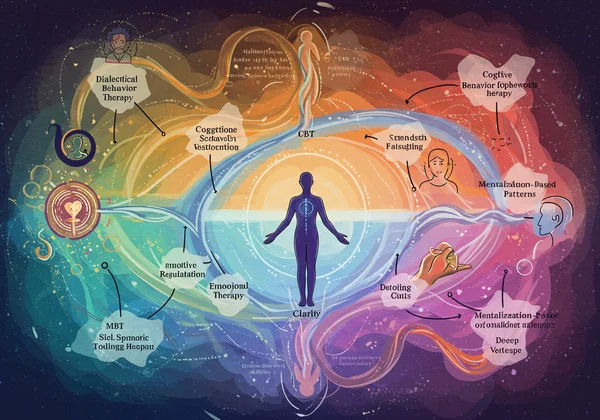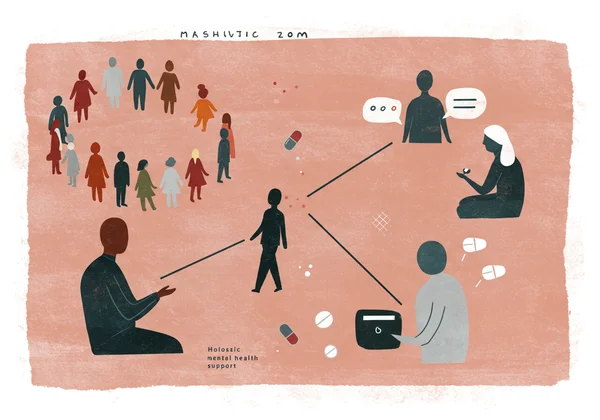Personality Disorder Test: Treatment & Support Options
September 7, 2025 | By Samuel Bishop
Taking a moment for self-reflection is a courageous first step on the path to well-being. If you've recently used a screening tool to explore your personality traits, you might be asking yourself, What do I do if I think I have a personality disorder after an online test? This question is a pivotal one, and it opens the door to understanding the available pathways to support and growth. This comprehensive guide will illuminate the professional personality disorder treatment options and support systems that can empower you on your journey.
Understanding your unique patterns is a sign of strength. While an online screening can offer valuable initial insights, the next step involves seeking professional guidance. The journey to mental wellness is not one you have to walk alone. To better understand your own traits, you can take the first step with a confidential screening.

Understanding Professional Therapy for Personality Disorders
At the heart of managing traits associated with personality disorders lies psychotherapy, often referred to as talk therapy. This is the primary and most effective approach for fostering long-term change. Therapy for personality disorders aims not just to alleviate symptoms but to help individuals develop healthier coping mechanisms, improve interpersonal relationships, and gain a deeper understanding of themselves and others. It is a collaborative process built on trust and guided by a trained professional.
Key Therapeutic Approaches and How They Help
Therapeutic approaches are not one-size-fits-all; they are tailored to an individual's specific needs, traits, and goals. The overarching goal is to reduce subjective distress, change unhelpful behavior patterns, and enhance self-awareness. A therapist will work with you to identify the core difficulties you face, whether they relate to emotional regulation, impulsivity, or social interactions. This process helps transform challenging patterns into more adaptive ways of thinking and behaving.

Dialectical Behavior Therapy (DBT): A Focus for BPD
Dialectical Behavior Therapy (DBT) is a highly effective, evidence-based treatment originally developed for individuals with traits of Borderline Personality Disorder (BPD), especially those with chronic suicidal ideation. Its success has led to its adaptation for other conditions as well. The core of DBT for BPD involves balancing acceptance and change. It teaches four crucial skill sets:
- Mindfulness: Learning to be present in the moment without judgment.
- Distress Tolerance: Managing painful emotions and situations without making them worse.
- Emotion Regulation: Understanding and reducing vulnerability to negative emotions.
- Interpersonal Effectiveness: Navigating relationships, maintaining self-respect, and asking for what you need.
DBT is often delivered through a combination of individual therapy, group skills training, and phone coaching, providing a robust support structure for individuals learning to build a life they feel is worth living.
Cognitive Behavioral Therapy (CBT) and Other Effective Modalities
Cognitive Behavioral Therapy (CBT) is another cornerstone of psychological treatment. It operates on the principle that our thoughts, feelings, and behaviors are interconnected. A therapist using CBT helps you identify and challenge distorted or unhelpful thought patterns (cognitive distortions) that lead to distressing emotions and problematic behaviors. By changing these thoughts, you can change how you feel and act.
Other valuable modalities include:
- Schema Therapy: This integrative approach helps individuals understand and change long-standing, self-defeating life patterns, or "schemas," that often originate in childhood.
- Mentalization-Based Treatment (MBT): This therapy focuses on helping people understand their own thoughts and feelings and to distinguish them from the thoughts and feelings of others. It is particularly helpful for improving relationship stability.
Exploring Medication and Holistic Mental Health Support
While therapy is the primary treatment, a comprehensive plan often includes other forms of support. A holistic approach that addresses biological, psychological, and social factors provides the best foundation for lasting well-being. This is where mental health support extends beyond the therapist's office.
The Role of Medication in Managing Personality Disorder Symptoms
It's important to understand that there is no specific medication to "cure" a personality disorder. However, medication can be a crucial tool for managing personality disorder symptoms or co-occurring conditions like depression, anxiety, or mood instability. A psychiatrist may prescribe:
- Antidepressants: To help with symptoms of low mood, anger, or impulsivity.
- Mood Stabilizers: To help regulate emotional swings and reduce irritability.
- Antipsychotic Medications: In low doses, these can help with paranoia or disorganized thinking.
Medication is most effective when used in conjunction with psychotherapy, as it can help stabilize your mood enough to engage more fully in the therapeutic process. If you're exploring your options, our free personality disorder test can be a helpful starting point for discussion with a professional.
Building a Strong Support System and Community Resources
Recovery and growth thrive in a supportive environment. Building a strong support system is a vital part of the healing process. This network can include trusted family members, friends, or partners who are educated about your challenges and can offer encouragement.
Beyond personal connections, community resources can provide a sense of belonging and shared understanding. Peer support groups, both online and in-person, allow you to connect with others who have similar lived experiences. Organizations like the National Alliance on Mental Illness (NAMI) offer resources, support groups, and educational materials for individuals and their families.

Navigating Your Path to Finding Qualified Help
The decision to seek help is a powerful one. Finding the right professional can feel daunting, but with the right information, you can confidently navigate the process and find the care that is right for you. Remember, this is about finding a partner for your journey.
How to Choose the Right Therapist or Mental Health Professional
Finding a qualified professional who is a good fit is essential for a successful therapeutic experience. Look for licensed professionals such as psychologists (Ph.D./Psy.D.), licensed clinical social workers (LCSW), or licensed professional counselors (LPC). When searching, consider professionals who specialize in personality disorders or in the specific therapies mentioned, like DBT or Schema Therapy.
Don't be afraid to "interview" potential therapists. During an initial consultation, ask about their experience, their therapeutic approach, and what you can expect from working with them. The connection you feel with your therapist—the therapeutic alliance—is one of the strongest predictors of positive outcomes.

What to Expect During Your First Steps in Treatment
Your first steps in treatment will typically begin with an intake assessment. This is a comprehensive evaluation where your therapist will ask about your history, current struggles, and goals for therapy. This is a collaborative process designed to create a personalized treatment plan.
It’s normal to feel nervous, but remember that therapy is a safe, confidential space. The goal is not to judge but to understand and help. Be open and honest to get the most out of the experience. The path forward may have challenges, but each step is a move toward greater self-awareness and control over your life. A confidential online test is a private way to begin this exploration.
Your Path Forward: Embracing Treatment for Well-being
Understanding that effective treatments and robust support systems are available is a message of hope. The journey begins with awareness, which you've already demonstrated by seeking information. From structured therapies like DBT and CBT to medication and community support, there are many tools that can help you build a more stable and fulfilling life.
Your results from a screening tool are not a destination but a signpost pointing you toward the next step. Embrace this opportunity to seek a professional evaluation. A qualified mental health professional can provide an accurate diagnosis and co-create a treatment plan tailored to your unique strengths and challenges. If you haven't already, explore our screening tool to gain preliminary insights and begin your journey toward understanding.
Disclaimer: This article is for informational purposes only. Our online personality disorder test is not a diagnostic test. It is a preliminary self-assessment tool. A formal diagnosis can only be made by a qualified mental health professional. If you are in crisis, please contact a local emergency service or a mental health crisis hotline.
Frequently Asked Questions About Personality Disorder Treatment
What are the first steps to seeking personality disorder treatment?
The first step is to schedule an appointment with a qualified mental health professional, such as a psychologist, psychiatrist, or licensed therapist, for a comprehensive evaluation. You can start by asking your primary care doctor for a referral or searching online directories for specialists in your area. Bringing any insights from a preliminary screening, like the one offered on our site, can be a helpful starting point for the conversation.
Can people with BPD have a normal life with therapy?
Absolutely. While "normal" is subjective, with consistent, effective treatment like DBT, many individuals with BPD traits learn to manage their emotions, build stable relationships, and lead meaningful, fulfilling lives. Treatment helps develop skills to navigate challenges that once seemed overwhelming, making recovery and a high quality of life achievable.
How long does therapy for personality disorders usually last?
The duration of therapy varies greatly depending on the individual, the specific personality disorder traits, and the type of therapy. Because these patterns are deeply ingrained, treatment is often long-term, lasting from one to several years. The focus is on creating sustainable change, not a quick fix.
What should I do if I think I have a personality disorder after an online test?
An online test is a tool for self-reflection, not a diagnosis. If your results suggest you may have certain traits, the most important next step is to consult with a mental health professional. Use the results as a catalyst to start a conversation with a doctor or therapist who can provide a proper assessment and guide you on what to do next. You can get initial insights on our website to help prepare for this conversation.
Are medications commonly used to treat personality disorders?
Medications are often used as part of a comprehensive treatment plan, but they are not the primary treatment. They don't cure personality disorders but can be very effective in managing specific debilitating symptoms like severe depression, anxiety, or mood swings, which can help a person engage more effectively in therapy.